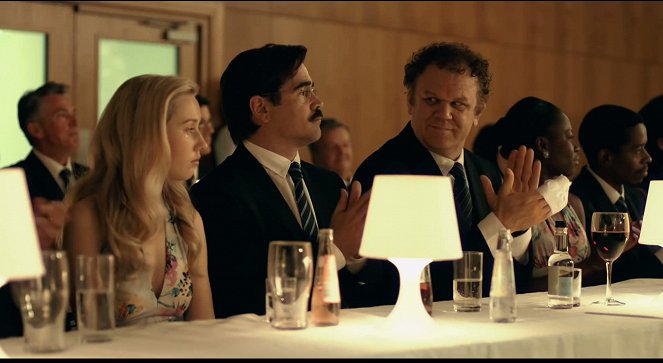Regie:
Yorgos LanthimosKamera:
Thimios BakatakisMusik:
Johnnie BurnBesetzung:
Colin Farrell, Rachel Weisz, Léa Seydoux, Ben Whishaw, John C. Reilly, Jessica Barden, Olivia Colman, Ashley Jensen, Ariane Labed, Angeliki Papoulia (mehr)Streaming (5)
Inhalte(1)
Irgendwo in naher Zukunft. Alleinstehende verlieren ihr Existenzrecht und werden in das 'Hotel' am Meer gebracht. Finden sie innerhalb von 45 Tagen keinen Partner, werden sie in Tiere verwandelt. Zumindest die Art darf frei gewählt werden. David, der mit seinem Hund, der eigentlich sein Bruder ist, eingewiesen wird, entscheidet sich für die Spezies Hummer. Als dem überzeugten Single die Flucht gelingt, trifft er im Wald auf eine Widerstandsgruppe, die wiederum keine Nähe duldet. Als er sich verliebt, gerät sein Leben erneut in Gefahr. (ORF)
(mehr)Videos (5)
Kritiken (12)
Filmchallenge 2018 - Griechenland. Ein absoluter filmischer Ausrutscher - im positiven Sinne des Wortes, was das Sujet und die einleitende halbe Stunde betrifft, im negativen Sinne bezüglich der Gesamtverarbeitung des Sujets und der verbleibenden zwei Drittel des Films. Jammerschade, denn es hätte einer der interessantesten Filme der letzten Jahre werden können. Eine hervorragende Besetzung, Colin und Rachel zusammen mit der eiskalten Léa zielten darauf ab. Trotzdem entstand ein knapp zwei Stunden langer Film, der ab einem verheißungsvollen Beginn schwankt, bis er in Langeweile ertrinkt. Man hätte nur einen geschickten Drehbuchautor und Dramaturgen gebraucht, der keine Angst hat. Ich habe widersprüchliche Gefühle und weiß eines ganz sicher, diesen Film werde ich auch in ein paar Jahren nicht vergessen haben, sei es im positiven oder im negativen Sinne.
()
With its cast of well-known actors and relatively comprehensible core story of forbidden love, The Lobster is Lanthimos’s most accessible film. At the same time, however, it is as comparably sharp in its satire, visually distinctive and unclassifiable in terms of genre as his earlier work, which was intended exclusively for the festival circuit. ___ The use of static shots, faded cold colours and passages from classical compositions played by string quartets adds disturbing undertones to the absurdist plot and prepares us for displays of instinctive aggression, which are shocking despite the fact that we don’t directly see most of them. The scenes of death and dying are filmed with the same cold detachment as the dialogue spoken by the actors without a hint of any emotion (which makes it even funnier). As a result, The Lobster is also strange in that it doesn’t draw attention to its strangeness. The transformation of people into animals seems as natural as the regular hunts for loners. ___ However, every protest has its own rules, which in the end can be just as restrictive as those against which we originally defined ourselves, as seen in the second half of the film. The ideology of the couple is replaced by an ideology of extreme individualism. Those who fail in their search for a partner are paradoxically punished by not being allowed to find one. As in A Clockwork Orange, the greatest evil here consists in the impossibility of free choice. Those who lose the possibility to make their own decisions also lose their individuality. This is precisely the aim of all repressive systems, including the one that Lanthimos invented for his film. ___ By taking the opportunistic logic of interpersonal interaction to extremes, Lanthimos exposes the mechanisms through which not only relationships, but essentially society as a whole function, at least outwardly. According to his bleak vision, people are condemned to an absence of freedom resulting from the unrelenting fear of what others think of them. At least the short-term solution to unsatisfying romantic cohabitation is to invent one’s own way of communicating that is not guided by the dominant ideology and is not based on rules that are social constructs (even though we perceive them as something natural). ___ Like in Dogtooth and Alps, the hermetically sealed microcosm of humanity serves Lanthimos as an experimental laboratory in which thought-provoking things happen, but which do not hold together well enough from the storytelling perspective. This was surely partly intentional. The use of various alienating devices (the omniscient narrator, the counterpoint of music and image) constantly pulls us out of the narrative and prevents us from simply enjoying the film. However, this can eventually lead to disinterest in the characters and what they are going through. ___ The considerations that The Lobster inspires keep us more engaged than the story that it tells. In my opinion, the recent Anomalisa is proof that it is possible to make an entertaining, relatively accessible and emotionally engaging film that also keeps an appropriate distance from its characters and thus works more with ideas than with emotions. Its protagonist is also punished for his solitariness, just in a less visible way than The Lobster’s David. 80%
()
(weniger)
(mehr)
Orwell style black-humorous romantic satire ... Bizarre? Definitely. Unique? There´s no doubt about it. Refined? Not even close. The first hotel half is incomparably better the second forest part, which is ruined mainly by the non-existent chemistry between the central couple that is "despite everything" very much in love and by the fact that it all fades away (and no, I do not mean the final scene). And now something completely different.
()
(50th KVIFF) One of the three best films I’ve seen in the Karlovy Vary Film Festival this year. A story about a totalitarian world where people must be paired, otherwise they are turned into the animal of their choice. David, the protagonist, has been left by his wife and for that reason he’s been taken to a Hotel were he’ll have about 45 days to find a replacement. After an unsuccessful attempt to pair with an insensitive woman, he escapes to the forest where he joins the Loners, a group who doesn’t acknowledge the rule of pairing, in fact, they observe the extreme opposite and punish any sign of courtship and love. A bizarre feat by bizarre Greek director Yorgos Lanthimos, who already has surprised with Dogtooth and disappointed with Alps. I believe I can say with certainty that The Lobster is his best film so far. The sci-fi label is a bit misleading, the process of turning people into animals is not addressed, it’s simply the portray of a perverted totalitarian regime with ridiculous rules, the breach of which is punished in a ridiculous way; where people have lost their humanity, speak like robots, follow ridiculous rituals and make their decisions based on ridiculous criteria. The film is told in a very detached way. The events are told by a narrator and the characters themselves in a distant and laconic manner. In particular, the first half, which takes place in the Hotel, is brilliant. Lanthimos gets all the juice out of the premise and creates one unforgettable scene after another (by the way, the film is incredibly funny at times, if you are into that thing). But it looses some of its strength when it moves to the forest and the group of Loners. It begins to squeeze into the disturbing satire the development of the secret (and not so interesting) relationship between Farrel and Weisz, which doesn’t mean that the second half is devoid of excellent scenes. 90 %
()
Except for a few festival crap shows, I never left the cinema before the closing credits. Until The Lobster. It was clear after twenty minutes that I wasn't on the same wavelength as the film, but I hung on for another half hour. That's all I could do. Overwrought drivel full of awkwardly declaiming actors, dysfunctional humour and romance, and a tragic attempt to pretend it is something more. I give that one star to the actors, most of whom I like quite a bit and felt sorry for. But Yorgos Lanthimos goes on the blacklist. And I’m buying a beer to whomever makes sure Johnnie Burn never composes music again.
()


